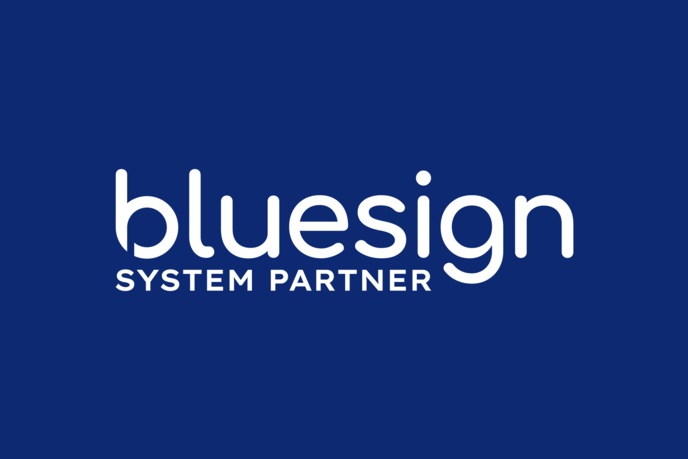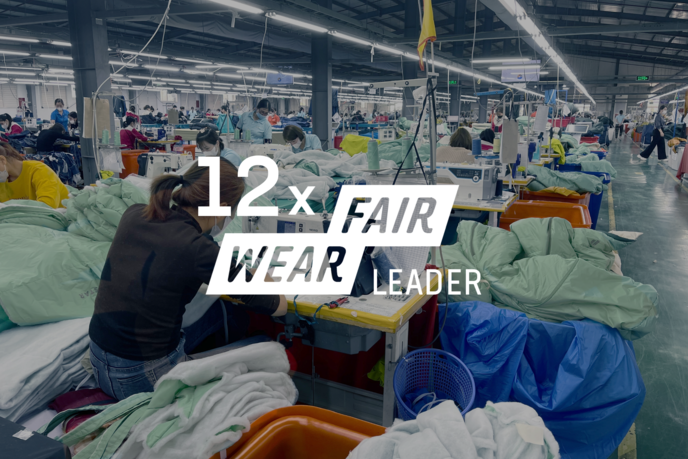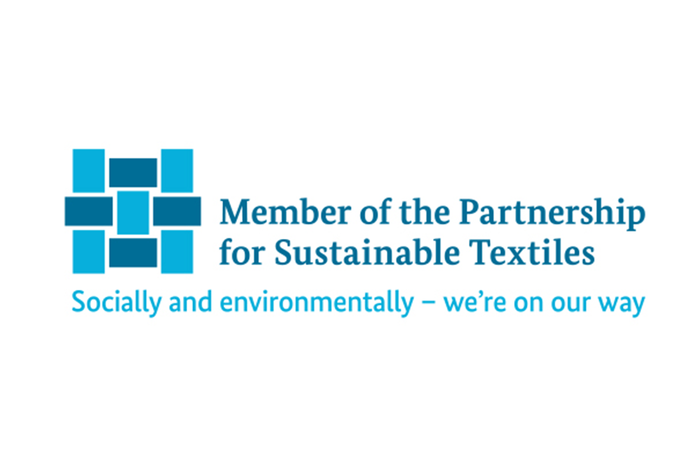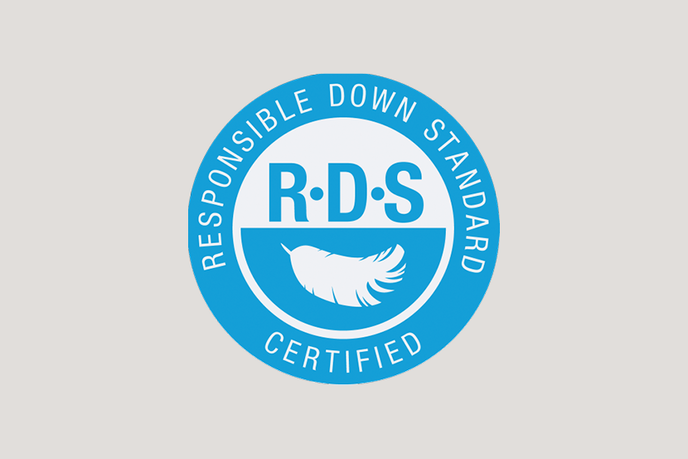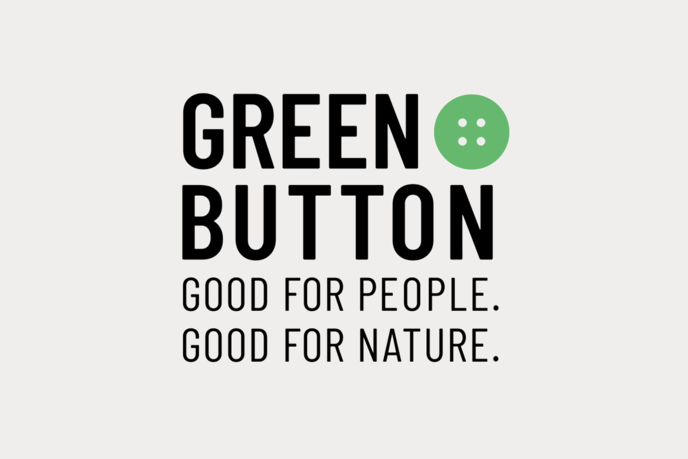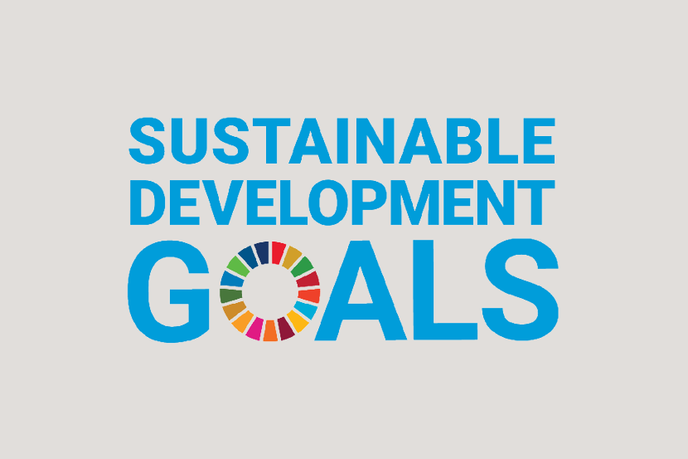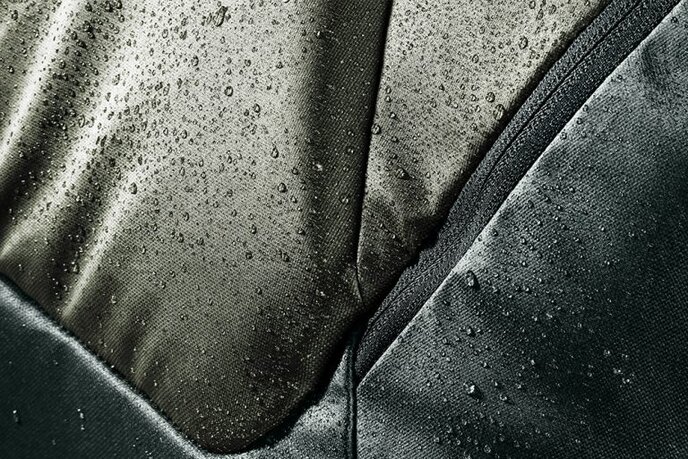Our standards

Our standards
EVERYTHING ABOUT THE BLUESIGN® STANDARD

Sustainability where textile production is concerned is an issue that affects us all. After all, it’s about what we wear on our bodies every day. Whether it’s jeans, a functional jacket or a backpack for hiking, biking or ski touring, the manufacturing process is complex and can have a significant impact on people and nature. So we want to make sure we minimize that impact. Which is why we are always looking for ways to optimize consumption at every stage of the production chain – from raw materials to finished product.
This includes the quantity, type and quality of materials used just as it does energy and water consumption, or the handling of chemicals, noise pollution, the waste generated and occupational safety. In our efforts to minimize the impact of our manufacturing processes on the environment, we’ve applied the bluesign® standard since 2008. It’s a coherent approach that fits perfectly with our 360° Responsibility strategy.
Here you can find all our currently completely bluesign® certified products.

Unlike most eco labels, the bluesign® system doesn’t just check the end product for harmful substances or chemical residue – it’s concerned with examining the manufacturing processes for all the individual components along the whole supply chain, and putting the fabrics that are used for our backpacks and sleeping bags through rigorous compliance checks. The same applies to the impact that the manufacturing processes have on people and the environment.
Using the ‘bluesign® criteria’, the manufacturing processes and the way the components are made are inspected and made more sustainable. These are then given ‘bluesign® approved’ status. Eventually, once each step in the supply chain uses sustainable materials and manufacturing practices, the product is then be declared a ‘bluesign® product’. These sustainably made products are made with a minimum of 90% ‘bluesign® approved’ fabrics and 30% ‘bluesign® approved’ component parts. It is our aim to hit 100% bluesign® approved components, in order to provide the highest standards in safety and achieve the greatest possible reduction in harmful substances.
Manufacturing textile products involves a lot of chemicals. They’re used to add color or waterproofing performance, for instance. According to bluesign® over 1000 chemical substances are used in the process. Of these, over 900 are harmful chemicals and must be carefully managed. In addition to questions of occupational safety, the way wastewater is processed or limited are also important issues. And so the chemists and engineers at bluesign® drew up a Restricted Substances List (RSL). There are over 800 banned substances listed, with the list updated on a yearly basis and open to public scrutiny. Chemicals included in the list are prohibited from use in production. The bluesign® standard also helps reduce the amount of resources used in textile manufacturing. According to bluesign®’s own statistics (Source: https://www.bluesign.com/en/business/our-story) their system leads to a reduction in water consumption of -50%, energy up to -30% and chemicals up to -15%.
It’s not easy to navigate the jungle of eco labels out there. We purposefully selected the most stringent set of standards that takes an all-encompassing, holistic approach to a fundamental aspect of our work. bluesign® is wholly committed to making textiles and textile manufacturing methods more sustainable. We view our collaboration with bluesign® as an essential step in combatting the overexploitation of people and nature. As someone who is passionate about the outdoors, and strives to only buy gear that’s sustainably made, when it comes to any of our bluesign® products, you can be sure of the following:
- harmful substances are restricted along the entire supply chain
- they are not made using environmentally harmful substances
- they are not harmful to human health
- controls and limits were upheld for the use of chemicals
FOR FAIR PRODUCTION

It’s something we all strive for – to make the world a better, more equitable place.
Wouldn’t it be good to know that each person involved in the making of a deuter backpack or bag was paid a living wage?
Wouldn’t it be good to know that important social standards were upheld in the making of your new deuter sleeping bag?
Consumers are increasingly, and rightly, demanding that fair working conditions are upheld in the manufacturing and trade of goods – whether it’s sports gear or breakfast muesli. Here at deuter, we know that we must take action. So, to make sure that our efforts are not diluted as individual acts, we’ve joined forces with others. deuter has been a member of the Fear Wear Foundation (FWF) since 2011 and held its Leader status every year since 2013. Together it is our goal to foster socially just, environmentally friendly, and sustainable manufacturing conditions.

Our involvement in the FWF is a key element in our Together for 360° Responsibility strategy. It is a multi-stakeholder initiative that works together with companies and factories to improve working conditions in textile and garment factories, particularly on the ground in production countries. Implementation of practices and schemes are regularly assessed by deuter representatives and independent experts alike. FWF membership also brings with it the efficiencies of a multi-stakeholder group, since other member companies often use the same production sites or ones in the same country, which means that some efforts to optimize processes can be carried out in a more efficient and less time-consuming way.
“To create change across the industry, we need all players on board."
With this statement at its core, deuter and 130 other brands from ten European countries are united as part of the Fair Wear Foundation. We’ve pooled our resources and together are committed to upholding the Code of Labor Practices, in order to create equitable business and production frameworks. The majority of Fair Wear’s work focuses on eleven priority countries: Bangladesh, Bulgaria, China, India, Indonesia, North Macedonia, Myanmar, Romania, Tunisia, Turkey, and Vietnam. If big, well-known manufacturers set a good example, then production partners cannot help but also act in a socially responsible way.
As members of FWF, we document all activities relating to our corporate social responsibility on an annual basis. The Fear Wear Foundation then assesses it and puts forward suggestions for improvements. Our dedication to fair working conditions at our supplier production sites has been recognized by the FWF from the very start of our membership in 2011. In 2013, and every year since then, we were awarded with their prestigious Leader Status. In 2015, we were also presented with the Best Practice Award for responsible purchasing practices.
We do not engage in supplier-hopping practices. We focus our efforts on our two longstanding manufacturing partners. We have also limited the number of subcontractors they use. The relationship we’ve built up with these two partners goes back decades. We carry out regular audits with our suppliers, to check that standards are being upheld and see where we can still improve. We’ve agreed that subcontractors must also apply the same working conditions as our two main suppliers. Workers at these factories can also access the FWF Complaints Hotline. This helps foster mutual trust and dependability. “We took the decision many years ago now, that long-term partnerships are the way to go,” says deuter Managing Director, Robert Schieferle. So let’s make way for a fair future for everyone!
For full details on the Fair Wear Foundation and the measures we’ve taken, check out our latest Promise Report and the Fair Wear Foundation website.
BRAND PERFORMANCE CHECK
The Brand Performance Check is a tool which the Fair Wear Foundation uses to figure out how the member brands’ business practices improve labour conditions. Every year, the Foundation reviews brands’ efforts by measuring how well they have assessed, identified and resolved issues with their suppliers. For example, the Fair Wear Foundation will check if a company’s production planning is realistic, making sure there are no late orders or unreasonable deadlines that could lead to excessive overtime. We then openly share these findings with the public.
For the reporting period from 01-07-2024 to 30-06-2025, deuter has achieved a benchmark scoring from 95 and has been awarded FWF Leader status for the 12th time in a row!
How we reduced excessive overtime

A WINNING TEAM
deuter is Germany’s most popular backpack brand. Because we set the bar high when it comes to the standards we expect of our backpacks and sleeping bags. But we don’t stop there.
We want to make outdoor equipment in an environmentally friendly, sustainable way, and under fair conditions. However, we consider socially responsible production and supply chains to be equally important. Drawing up a few regulations for our production sites doesn’t go far enough. Other suppliers, such as spinning, dyeing and weaving mills, as well as finishers and textile printers, are part of the long supply chains involved in making our products. The more parties involved, the harder it is to monitor compliance with social and environmental standards. The world’s a complex place and as an individual brand it lacks transparency. Which is why we’re collaborating with other manufacturing partners and companies in the Partnership for Sustainable Textiles, or Textile Alliance for short. The collaboration helps us to break down the complexity of it all and ensure greater transparency.

How are major challenges tackled? We collaborate with other members to share expertise, strategies and ideas. By working together, we achieve way more than one company on its own. These principles underpin the Textile Alliance, whose core members are 86 companies and 14 trade associations. The organization was created by the German government in 2014 in response to the Rana Plaza factory disaster in Bangladesh.
Both major players and medium-sized enterprises are on board; Adidas and Aldi, H&M as well as outdoor gear suppliers deuter and Schöffel. They are also joined by 20 NGOs, such as the WWF or FEMNET E.V., labor unions like DGB and IG Metall and representatives from the German government.
The objective is to improve social and environmental conditions in textile production worldwide. All measures are conceived so that member organizations are responsible for taking action themselves. The approach is a comprehensive one and is in line with our Together for 360° Responsibility strategy. Our Stronger Together motto applies beyond the Textile Alliance too. The alliance collaborates with the international, multi-stakeholder Fair Wear Foundation, which we also play an active role in.
The Textile Alliance wants to make a difference. Which is why its activities are diverse. Dealing with environmental concerns, ensuring living wages and combating corruption are all issues that member organizations deal with. The alliance focuses on 11 areas:
- Freedom of association and collective wage bargaining
- Discrimination, sexual harassment and gender-based violence
- Health and safety
- Wages and welfare benefits
- Working hours
- Child labor and forced labor
- Combating corruption
- Waste water and the use of chemicals
- Environmental protection and resource usage
- Greenhouse gas emissions
- Animal welfare (including sheep farming)
Just like all the other member organizations, we draw up a report every two years. This report casts a critical eye on socio-environmental conditions, as well as the risks of compliance violations. The Textile Alliance is an effective way of preventing apathy. It requires member organizations to analyze their production conditions openly and honestly. The new review process also guarantees that an organization exercises diligence and can demonstrate a sophisticated risk-management process. All the compliance conditions for the Textile Alliance create the perfect foundations for the Green Button certification process and the German Supply Chain Act. At the same time, the Textile Alliance offers support and tried-and-true concepts. The more organizations that join the Textile Alliance, the more effective the measures will be.
Responsible Down Standard – for the love of animals

How do you think it would it feel to have someone rip the hair from your head, without any sort of anesthetic? Certainly not good. So it makes sense that plucking (“harvesting”) down from live birds has been banned in Europe since 1999. But do we really need a special standard that regulates how down from geese and ducks gets into sleeping bags? Yes, we do. Because just as in meat production, existing laws provide a certain framework but still leave loopholes that can lead to animals suffering – even if they aren’t live plucked. That is why we have been using down that complies with the Responsible Down Standard (RDS) for our down sleeping bag fill since 2015.

The Responsible Down Standard (RDS) monitors and ensures that down and feathers come from animals that have not suffered unnecessarily. The practice of live plucking and force-feeding in down production can result in serious harm to the animals. The standard offers you and us the certainty that the entire production and supply chain is traceable, from the chicks to the cleaned down to the finished sleeping bag. Only if animal welfare is respected at all stages does the sleeping bag meet the specifications of the RDS certificate. That is why we only work with RDS-certified suppliers who themselves only use certified down. You can recognize them by the "Responsible Down Standard" logo. Finished deuter products containing this certified down can then be recognized by the "Certified Animal Welfare" logo
Besides the ban on live plucking and force-feeding, the RDS contains a number of other animal welfare provisions. These include:
- Sufficient feed, without undue competition from other animals
- No use of growth hormones
- Avoidance where possible, of genetically modified feed
- Sufficient clean drinking water
- Clear rules on hygiene and space requirements for housing as well as sufficient outdoor space
The down in our sleeping bags comes from northern China, from free-range adult white ducks. These ducks are bred for the food industry. Their down is a by-product of meat production. This rules out live plucking. And there is no gavage (force-feeding) either, as foie gras only comes from grey geese and, besides, there is no demand for it in China. All RDS criteria and the traceability of the supply chain are checked unannounced by independent certification bodies.
Down is a miracle of nature – and probably the best protection against the cold. It comes from the plumage of geese or ducks. The downy, or fluffy under-feathers act like a large air cushion and thus insulate better than any synthetic fiber. Thanks to its high elasticity, down quickly regains its original shape – even if it was previously compressed in a sleeping bag stuff sack. In addition, down is extremely light and can absorb a lot of moisture. However, if down gets really wet, it loses its loft – like a soft layer of powder snow that suddenly collapses in the rain. Down from geese and eider ducks provides the best warmth.
Read here about what you can do to maintain the insulating performance of your down sleeping bag for as long as possible:
All of our down sleeping bags comply with the Responsible Down Standard. They are filled with 100 percent certified down. These lightweight and highly insulating sleeping bags also meet the requirements of the bluesign® standard. They are made under fair working conditions, with as little impact on the environment as possible. So you can enjoy a good night’s sleep with a clear conscience.
Green Button for green products
The well-being of both nature and people is important to us. That is why we want to live up to our own responsibility and manufacture our products as ecologically and socially sustainable as possible. We have already achieved a lot on our way to a green process and appropriate production conditions. But there is always room for a little more. Which is why, since 2021, we have had all our bluesign® products certified with the Green Button (Grüner Knopf) seal. And in that same year, all our company-level criteria were inspected by Green Button and approved. The Grüner Knopf is the first government-monitored label for sustainably produced textiles. It was launched by the German Ministry for Economic Cooperation and Development. It acts as an umbrella for all the standards. As we act holistically as part of our "Together for 360°-Responsibility" vision and meet the strict requirements such as the bluesign®, Fair Wear Foundation, Textile Alliance and Responsible Down standards in the areas of corporate responsibility, ecological harmlessness and fair working conditions, we are positioned as a sustainable brand and have been able to meet the Green Button criteria.


In order to bear the seal, products must be manufactured in line with strict environmental and social standards advised by the government. The Green Button audits companies on their due diligence and products on how they are made, with regard to chemical use, environmental impact, and working conditions. When a product bears the Green Button logo, consumers can be assured that they are buying sustainable textiles. Although the initiative was at first primarily run in Germany, it is a global partnership based on European and international standards. Companies outside Germany can also apply to have their production and products audited for certification. Independent auditors monitor compliance according to 46 standards and criteria. The Green Button organization also cooperates with Germany’s national Partnership for Sustainable Textiles (Bündnis für nachhaltige Textilien or Textilbündnis for short).
Green Button textile products must meet or exceed 46 social and environmental standards. The social standards include the payment of minimum wages, adherence to clearly defined working hours and paid overtime, and the prohibition of forced and child labor. The environmental standards include the prohibition of softening agents and other hazardous chemicals, as well as pollution limits for wastewater generated during the manufacturing process. The audit also covers another 20 criteria such as: Is there a local complaints mechanism for sewing workers? Do we take effective action to avert potential negative impacts? Are we identifying social and economic risks in the supply chain? We have joined the Green Button out of our conviction that “It’s good for people and good for the environment.” Our aim is to protect people and the environment along the entire supply chain – from resource extraction to the finished backpack or sleeping bag.
Find more details on Green Button standards here.
Our measures to comply with important environmental standards and fair production conditions have been rewarded. In August 2021, we were officially certified and allowed to use the globally recognized seal.
But nothing stays the same. The Green Button has also been further developed with the help of an independent advisory board and has grown thanks to valuable feedback from stakeholders. The result is version 2.0 of the Green Button Standard, which sets new requirements for corporate due diligence processes and conditions for product claims as well as processes and requirements for the recognition of seals for members. In particular, the label-related requirements for the manufacturing processes of products are now also aimed at the raw material level in addition to manufacturing and wet processes. In addition, products are made exclusively from approved fibers and materials.
After successfully passing another strict audit, we have also been officially certified in accordance with Green Button Standards 2.0 since September 2023.
GLOBAL SUSTAINABLE DEVELOPMENT GOALS for Sustainable Development
In 2015, member states of the United Nations adopted the 2030 Agenda, which serves as a comprehensive roadmap to a peaceful, sustainable, and prosperous world for us all. The Agenda is underpinned by 17 Sustainable Development Goals (SDGs). The goals outline specific steps toward ending poverty, improving health, education and gender equality, boosting economic growth while combatting climate change and looking after the oceans and forests.

Compliance with the Agenda is voluntary because the goals and measures aren’t legally binding. By signing the agreement, those concerned have made a declaration of intent to put it into practice in a collaborative way. It presents a huge challenge for countries, because they have no real leverage other than appealing to a sense of social responsibility. Lots of businesses already view their role as one within society, however, and have therefore adapted the SDGs to their company. The principle being that what cannot be achieved alone, can be achieved together.
At deuter, we also see ourselves as part of the global community and want to step up to the plate. The deuter Promise sets out a transparent CSR agenda and sustainability standards for the way we run our business each and every day. We use the SDG roadmap to help us establish these. As a result, we’re able to implement structured sustainability programs along our supply chain. The subsequent actionable areas are clearly worded, achievable, quantifiable, and binding.
But where do we start? It’s something we asked ourselves a long time ago. And we realized it must start with our own business. We also realized we need partners with the skills and expertise that we lack. We need more resources and well-trained co-workers with the requisite experience to forge ahead with our CSR and make us all take action. Because sustainability isn’t just a corporate vision, it’s a philosophy that guides all our daily actions. It is deeply embedded in every co-worker and reflected in all of us. Consequently, we started to take a closer look at everything we were doing and identify actionable areas, similar to the SDGs. These included self-assessment, developing action plans and setting clear goals that we want to achieve by 2025.
The Sustainable Development Goals in detail.
The 2030 Agenda encompasses 17 global goals and 169 targets on a wide range of issues to enable people to live decent lives and to ensure the planet can continue to sustain all life forms. The SDGs, which govern the actionable areas we want to take, are listed and outlined in detail below. We used the wording of and statements by the German government, the Department of Economic and Social Affairs of the United Nations and the German Association for Sustainability.*
Why are deuter products ‘Made without PFAS’

PFAS (per- and polyfluorinated alkyl substances) are a group of synthetically produced chemical substances that have been used in industry and consumer goods since the 1940s because of their useful properties. They have water-, grease- and dirt-repellent properties which means they are used in the surface treatment of everyday products such as dirt- and water-repellent textiles, non-stick cookware, electronic household items and in the paper finish on food and beverage packaging. PFAS are also found in beauty products, cleaning agents, fire-fighting foams, cable sheathing, hydraulic fluids. However, these very useful substances are extremely toxic. They can enter the environment during the manufacture, use and disposal of products, with harmful results for humans, animals and nature. Once in the environment, they disperse quickly and widely, and only degrade very slowly - over several hundred years - or in some cases not at all.
In the outdoor sector, PFAS are used for their water-, dirt- and grease-repellent properties for the waterproofing surface treatment of textiles, tents and shoes, among other things, and for the production of water-repellent and breathable membranes.
This coating is known in the industry as DWR, short for durable water repellent. It makes products dirt-repellent and ensures that water beads off the surface and the material does not get wet through and heavy.
PFASs are also found in ski wax and bicycle oil.
deuter now uses a DWR (Durable Water Repellent) finish that is harmless to human and animal health and to the environment, which does not contain any PFAS. This special surface treatment guarantees that water beads off the outside of the textiles and the product stays dry. This method marked a breakthrough for deuter for waterproofing textiles in an environmentally friendly way and to manufacture entirely without PFAS. However, we continue to work on improving our materials and finishes, both in terms of performance and environmental impact.
deuter repair service
BETTER TO REPAIR THAN THROW AWAY
Long-term durability is extremely important for our products, because we want you to enjoy your favourite pieces for as long as possible. By extending the life cycle of your deuter product, we also contribute to conserving resources. Because repairing is better than throwing away. This has been a tradition at deuter: our qualified specialists have been carrying out repairs on-site at deuter for 125 years.

